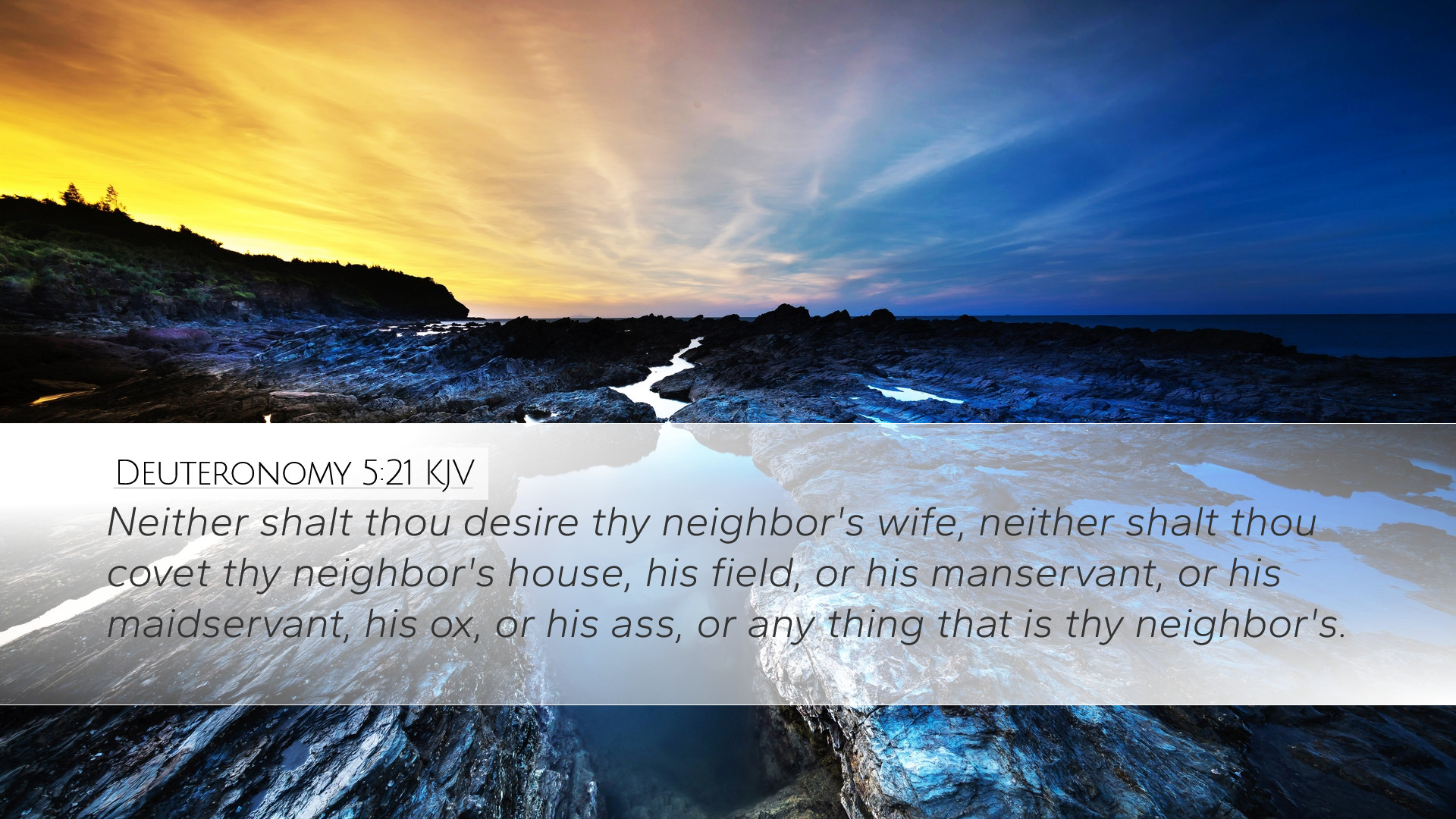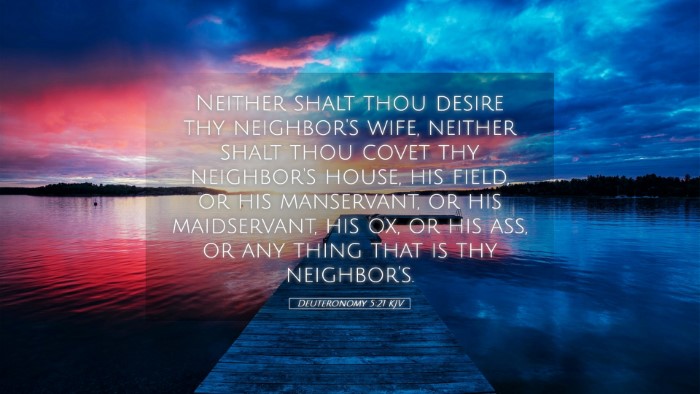Commentary on Deuteronomy 5:21
Bible Verse: "You shall not covet your neighbor's wife; you shall not desire your neighbor's house, his field, or his male servant, or his female servant, his ox, or his donkey, or anything that belongs to your neighbor." (Deuteronomy 5:21, ESV)
Introduction
The tenth commandment, as articulated in Deuteronomy 5:21, plays a pivotal role in the moral framework laid out in the Pentateuch. This commandment addresses the inner disposition of the heart, emphasizing the need for integrity and purity in desire. Unlike the preceding commandments that focus on outward actions, this commandment probes deep into the human psyche, revealing the importance of our thoughts and intentions.
Insights from Public Domain Commentaries
Matthew Henry
Matthew Henry highlights the prohibition against covetousness as central to maintaining social harmony and integrity. He notes that coveting leads to a cascade of sinful actions, often culminating in theft and adultery. Henry reminds us that the commandment transcends mere prohibition; it invites believers to cultivate a contented spirit that finds sufficiency in God's provisions.
He elaborates on the idea that coveting not only affects personal relationships but also the communal fabric. When individuals desire what belongs to others, it can incite jealousy and discord, disrupting the peace within families and societies. Hence, this commandment serves as a safeguard against the destructiveness of envy and greed.
Albert Barnes
Albert Barnes provides a detailed analysis of the elements included in this commandment. He points out that the items listed—wife, house, servants, livestock—represent various aspects of personal and economic life during the ancient Israelite society. Each component reflects stability, security, and status. Therefore, the commandment challenges believers to reflect on their disposition towards earthly possessions and relationships.
Barnes emphasizes that God's intent behind this commandment is to foster an appreciation for what one possesses rather than a constant longing for what belongs to others. He proposes that coveting is deceptive; it leads individuals to believe that happiness lies outside of their current circumstances, which can result in discontent and strife.
Adam Clarke
Adam Clarke offers a theological perspective, positing that coveting is rooted in a fundamental sinfulness of human nature. He underscores that the heart must be kept pure, as the desires of the heart often manifest in outward actions. Clarke goes on to explain that this commandment not only addresses the act of coveting but also implores individuals to align their desires with God’s will.
Moreover, Clarke connects this commandment to the broader themes of justice and love in the kingdom of God. He asserts that a heart filled with love and gratitude towards God will naturally steer away from sinful desires for what does not belong to it. Thus, Clarke encourages believers to examine their hearts and intentions, advocating for a life marked by contentment and stewardship rather than rivalry.
Theological Implications
The implications of Deuteronomy 5:21 are profound for contemporary believers. It teaches that true righteousness stems from the heart's attitude and that the internalization of God’s laws fosters ethical living. Pastors and theologians can draw from this verse to address issues of materialism and dissatisfaction that plague modern society.
Practical Applications
- Personal Reflection: Individuals are encouraged to engage in self-examination regarding their desires. This includes asking God for help to cultivate a spirit of contentment and gratitude.
- Preaching and Teaching: Pastors can use this commandment as a foundation for sermons that explore the nature of desire and its intersection with faith.
- Community Building: Churches should promote an environment that fosters joy in each other's successes, combatting the tendency toward envy and competition.
Conclusion
Deuteronomy 5:21 serves as a timeless reminder of the importance of internal purity and the need to guard one's heart against destructive desires. By leaning into the wisdom of past commentators, believers can glean insights that promote a fruitful and holy life, aligned with God’s commandments and filled with gratitude for His blessings.


